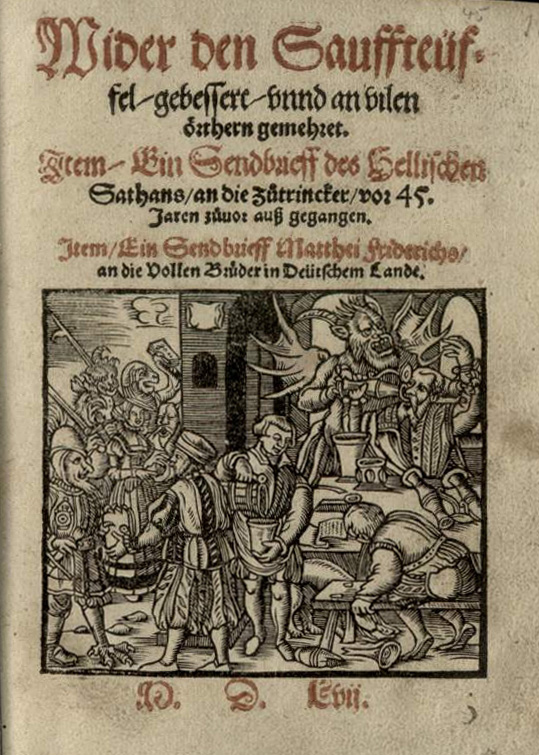Against the Drink Demon: Matthäus Friedrich (1557)
Abstract
Martin Luther was not the sole critic of the German vice of alcohol consumption; in 1552, Matthäus Friedrich published Against the Drink Demon [Wider den Sauffteuffel] to warn against the bad habit of drinking. Other contemporary “demon’s books” [Teufelsbücher] took aim at other vices (e.g., gambling, cursing, etc.), but the Drink Demon emerged as the most enduring and commercially successful title in the genre. It was published in twelve editions; the excerpts featured below are from the 1557 edition.
Source
[Dedicated to] The Noble Gracious and Honorable Erasmus of Künritz, Knight of Lobschitz,[1] my generous feudal lord and benefactor.
To begin: God’s mercy and peace, as well as a happy new year in Jesus Christ, our Lord. Steadfast and gracious captain, generous dear man, many maintain—and see the evidence in practice—that every land has its own land demon, every city its city demon, every single village its village demon, every noble court its court demon, every single house its house demon, indeed, every estate, every individual its own demon who incites it to sin and plagues it. Indeed, one sees that certain lands, cities, houses, and people are more seriously assailed by certain vices than others.
So it is that Germany, more so than other lands, has always been afflicted by the Drink Demon, which drives us Germans to drink day and night and does not leave us in peace until we are tipsy and drunk.
No one believes that drinking is really a significant sin, except for the upright Christians; the others have been so enchanted by the Drink Demon that they do not hold it to be a sin or unchristian vice at all but rather consider it to be an idle virtue and, as the prophet Isaiah says in the third chapter: They make no effort to conceal their nature and flaunt their sins like those in Sodom and do not hide them. Woe to their souls (he says), for they bring great unhappiness upon themselves.
What could one do, however, to direct and defend against this demon? Nothing is possible except for every individual person to resist for himself with the sword of the Spirit, with God’s Word, within which is the power of God [Rom. 1]. And to pray against it with a strong, upright faith. Those are the best weapons against which the devil cannot prevail when called upon. In addition, the preachers should earnestly preach and exhort [their listeners] against it [i.e., drinking] and provide a good role model for everyone. The authorities should punish without hesitation those who scorn God and the epicurean swine, the drunkards; and they themselves should avoid excessive drink. Parents should warn their children and household servants of it and keep from afflicting it upon them themselves. If all this were to happen, there can be no doubt that the Drink Demon would be forced to toddle off from Germany, or would at least be hindered in his rule, and that there would be less drunkenness.
But although many pious, educated Christian preachers and others have issued admonitions in person and in writing against drunkenness—in other words, have confronted this terrible demon—and, though it has proven useful in some cases, it is quite apparent that the majority pay no attention at all and (as the world is accustomed to doing) throw all true admonitions to the wind. And it is just as obvious that God has begun meting out punishment upon the Germans for the willful disregard of his Word and for this and other vices, and a more severe punishment must be feared if there is no improvement.
In order to ensure that more of these Drink Demons might be beaten down (for God’s Word is never without effect, as God proclaims in Isaiah 55, and God sometimes works through a lowly, simple person to annoy the devil greatly), and so that no one might have an excuse, I have permitted myself to record my own teaching on drunkenness, which I have taken from God’s Word and from daily experience, in the simplest terms possible and thus to place in the fist of each individual (to the extent that he wants to accept it) a sword against the Drink Demon, with which he might be able to resist [its temptations], chase it away, and hold his ground on the battlefield.
And I have issued this instruction in your grace’s name, first of all, because I have myself seen and witnessed the extent to which you, as a Christian ruler, are a particular enemy of such vice, and, in addition, because I have benefited from your good deeds. I ask that your grace might recognize and accept this dedication from me in your generosity.
May your grace, together with your grace’s virtuous wife, the godmother of my dear wife, and your two dear children be commended to God the Father of our Lord Jesus Christ and us all. May he keep you and all yours in the pure knowledge and confession of his Holy Word and Name until the end of time, in the name of his dear Son, Jesus Christ, Amen. Dated in Göhrenz, on the Feast Day of the Apostle Thomas [Dec. 21], Anno 1551.
Your grace’s willing servant
Matthäus Friederich,
pastor in Göhrenz.
Notes
Source: Matthäus Friedrich, Wider den Sauffteuffel, Gebessert unnd an vilen örthern gemehret. Item ein Sendschreiben des hellischen Satans die Zutrincker ... Item ein Sendbrieff an die vollen Brüder in Deutschem Lande. Franckfurt a. d. O., 1557, preface. Available online at: http://daten.digitale-sammlungen.de/bsb00017874/image_1
